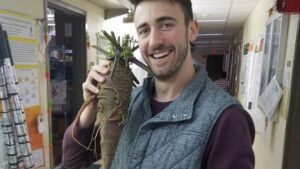Marcel Bruins, the editorial director for European Seed, sat down with Sandra Goritschnig, scientific officer at the European Cooperative Programme for Plant Genetic Resources (ECPGR) at the Euroseeds 2022 Congress to talk about the ECPGR and some of their successes.
“The European Cooperative Programme for Plant Genetic Resources (ECPGR) is a collaborative program of European countries. Our current 35 Member States work together on improving the conservation and sustainable use of plant genetic resources in Europe,” Goritschnig said. “We work through crop specific and thematic working groups, where we bring together crop and genetic resources specialists to work together on conservation and research projects.”
ECPGR also maintains the European database on plant genetic resources – the EURISCO catalogue — which provides information on more than two million plant accessions maintained in European gene banks. EURISCO includes both passport and phenotypic data.
Since 2020, ECPGR has been publishing an open-access journal called Genetic Resources. “The journal is in collaboration with the European Regional Focal Point for Animal Genetic Resources, ERFP,” she explained. “It provides a platform for our stakeholders to publish their research results, but also tools and reports that are relevant for their work.”
Goritschnig said their Plant Genetic Resources Strategy for Europe published in 2021 identifies gaps in plant genetic resources conservation in Europe, as well as necessary actions and step changes that are needed to ensure that Europe safeguard and sustainably use its genetic resources.
Since 2019, ECPGR coordinates the European Evaluation Network (EVA), working on wheat and barley, maize, lettuce, carrot and pepper. In these crop networks, EVA brings together genebanks, research institutes and breeding companies to form public-private partnerships that jointly evaluate crop accessions in multilocation phenotypic trials, while genotyping all accessions to unlock the full potential of the generated data for breeders. Through this project, breeders get access not only to material that is often difficult to obtain, but they also share expertise and knowledge, and get access to large phenotypic datasets from field trials conducted across Europe. Breeding companies have been very positive about their participation in EVA and the benefit this brings to them.
To hear more, watch the interview above.










